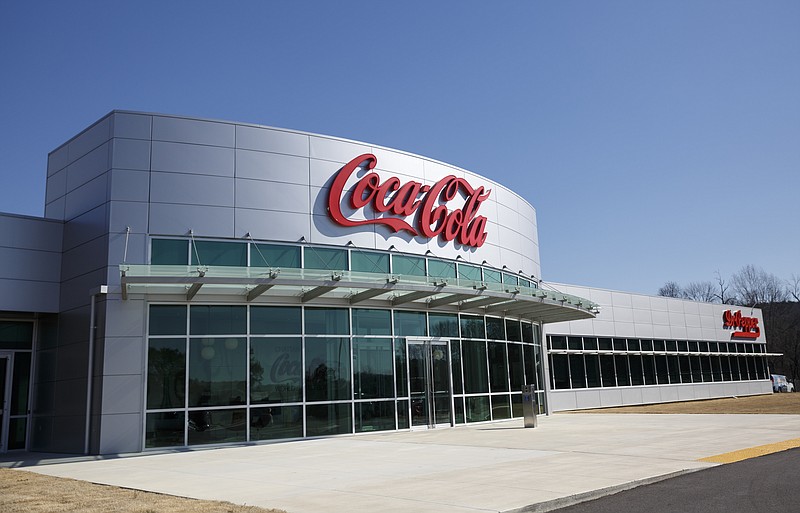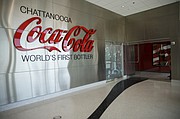Here in Chattanooga, Coke has roots.
They're deep roots, the type which give pause to talk of uprooting a facility here and moving it across state lines. A 117-year history with a town will do that.
And, it did do that.
On Tuesday, a brand-new, $67 million Coca-Cola Bottling Company United distribution center and regional headquarters will host its grand opening at 2111 W. Shepherd Road. The opening of the 305,000-square-foot facility will mark the completion of a years-long process to upgrade Coke United's Chattanooga facilities, moving regional distribution and local sales out of the Amnicola Highway facility and into these new digs, complete with a glistening wall of windows and glass doors at its entrance, and a huge, classic Spencerian Coca-Cola logo facing Highway 153.The new Chattanooga distribution center will move about 680 products (including various packaging and sizes), and will move, on average, 25,000 to 60,000 cases of Coke-owned products every night at a rate of roughly 5,600 cases an hour, thanks in part to a state-of-the-art automated warehouse picking system, a first-of-its-kind among Coke United facilities.
The decision to build this new distribution and sales headquarters in Chattanooga came down from Coke United two years ago, after some talk about building it in several places, including north Georgia.
Back then, the empty Olan Mills campus was here off Shepherd Road, and on paper, it cost more to acquire that vacant industrial property, demolish the existing commercial structures, do soil and dirt work and then build a new facility from the ground up, compared to starting from scratch somewhere else.
But Chattanooga is a Coke town.
"The world's first bottler deserves to be in Chattanooga," Stan Ellington, vice president of supply chain and operations at Coke United, said last week about that decision. "There's a lot of heritage in Chattanooga."
James Quincey, president and chief operating officer of Atlanta-based The Coca-Cola Co., also weighed in.
Quincy said 117 years after securing the first ever Coke bottling rights, and blazing the trail for the modern Coca-Cola bottling and distribution model, it's fitting the facility should remain here in Chattanooga, "in the place where the world first loved Coca-Cola in a bottle."
***
Darren Hodges, division director of Coke United's Tennessee Valley Division, has been moved in at the new office on Shepherd Road for a couple of months now, while the rest of the staff moved in at the beginning of February.
Hodges is a Chattanoogan to the core. He's from here, attended college at UTC and started with Coca-Cola Bottling loading trucks.
"Mr. Hodges has really gotten our attention. We trust him, at this point," said Malcolm Walker, president of the Shepherd Community Council. "He's one of Chattanooga's own."
Coke's green-suited fleet drivers greet Hodges when he passes by their time clock and break room.
Hodges is as proud of Coca-Cola as he is his hometown. Nobody was happier, or more relieved, when Coke United decided to build its new facility here, instead of elsewhere.
Leading a tour of the new distribution and sales headquarters recently, Hodges showed off the new building's ample space, its new features, its automated picking software in the expansive warehouse and the rows of Coke products waiting to go out on trucks all over the Tri-State area.
"It's built to do 13 million cases (a year)," he said. "We're doing 11 million today."
The automated warehouse technology even knows when a pallet is stacked unevenly, and flags it.
"I have no idea how it knows," said Nick Hoyt, first shift warehouse manager.
Hodges loves it.
"We referenced automation in the previous announcement," he said. "This is it."
The practical needs of the distribution facility are also met: there's enough dock and parking space for all the trucks in the fleet, and a full-size service bay for fleet vehicles (even full-size tractor-trailers) and an indoor washing bay, also large enough for a full-size tractor-trailer.
At Amnicola, the truck loading infrastructure was also at capacity, and "we were loading trucks just for Chattanooga," there, Hodges said.
The new facility can store tools, parts, tires, all on-site.
And inside in the office, there's still ample floor space for growth as Coke United grows. The building is split into distribution offices, where Chattanooga, Dalton and Scottsboro, Ala., distribution is managed, and local sales offices, where Chattanooga and Dalton sales are handled.
And there is ample conference room space - a monumental upgrade from Amnicola, joked Hodges.
At the 1970s-era Amnicola Road facility, there's one conference room, and "we couldn't put all of our sales employees in that room," he said.
"This really sets us up for growth in the future as Coke United expands," Hodges said.
The Amnicola Highway production facility will remain in use, as Coke United cans Coke products and bottles Powerade and juices there. The new Shepherd Road headquarters will house no production facilities, only distribution and sales.
The new headquarters employs 259 people, including 78 sales people and merchandisers who sell and deliver product. The new Shepherd facility created just over 40 jobs, and saved 200 in Chattanooga, which would have gone wherever the facility landed.
In the Coke United Tennessee Valley Division, there are now 259 employees at the Shepherd headquarters, 250 employees at the Amnicola plant, 84 at the Scottsboro sales and last-mile distribution center and 45 employees tasked with handling the Dalton territory.
***
Going forward, it's possible the Chattanooga-headquartered Tennessee Valley Division of Coke United will continue to grow.
Coke United is a significant player in The Coca-Cola Company's independent bottling infrastructure.
"They've always been a real key part of the Coca-Cola bottling system, but they're taking on an even more important role right now," said Duane Stanford, editor of the trade publication Beverage Digest.
Since 2010, The Coca-Cola Co. has been selling off distribution territories across the country to independent bottlers like Coke United, in an effort to get itself out of the bottling and distribution game. The Coca-Cola Co. still owns the Coke syrup recipe and marketing rights, and sells them to companies like Coke United.
Coke United today is the largest privately-held Coca-Cola bottler in the country, and the second-largest overall, behind only Charlotte, N.C.-based Coca-Cola Bottling Company Consolidated.
In recent years, Coke United has picked up territories in north Georgia, north Alabama, Louisiana and Florida.
And "as they buy new territories, it would make sense for them to begin to consolidate their distribution," said Stanford.
Coke United officials have said since 2014 that the decision to build the Tennessee Valley Division headquarters was, for a time, not a forgone conclusion in Chattanooga's favor.
Chattanooga elected and economic officials didn't want to see the facility go somewhere else, so the city offered Coke United a payment-in-lieu-of-tax (PILOT) agreement on the 31-acre Olan Mills property in Shepherd. In 1981, the Olan Mills portrait photography company built a film processing facility at the site and handled millions of photos, even as the company was sold to Minnesota-based LifeTouch in 2011.
LifeTouch closed the Shepherd facility in 2012.
Coke's PILOT agreement calls for the company to pay only the school portion of local property taxes on the Shepherd site, or about 27 percent of what the total property tax would normally be.
Over the next nine years, the percentage of general city and county taxes will increase incrementally.
When the tax abatement period expires in 2027, Coke will begin paying normal property taxes. Coke has previously made good on other PILOT agreements at its Amnicola site, fulfilling economic officials' demands in exchange for tax breaks for improvements and expansions.
Carol Berz, city councilwoman representing the area, praised Coke's rehabilitation of the industrial, suburban Shepherd property.
"As Chattanooga's growing and changing, we have to use all of our available land," she said. "This is a prime example of that happening at every level."
The new Shepherd facility will host its grand opening at on March 1 - ushering in the next chapter in the story of an original Coke town, 117 years and counting.
Contact staff writer Alex Green at agreen@timesfreepress.com or 423-757-6480.

